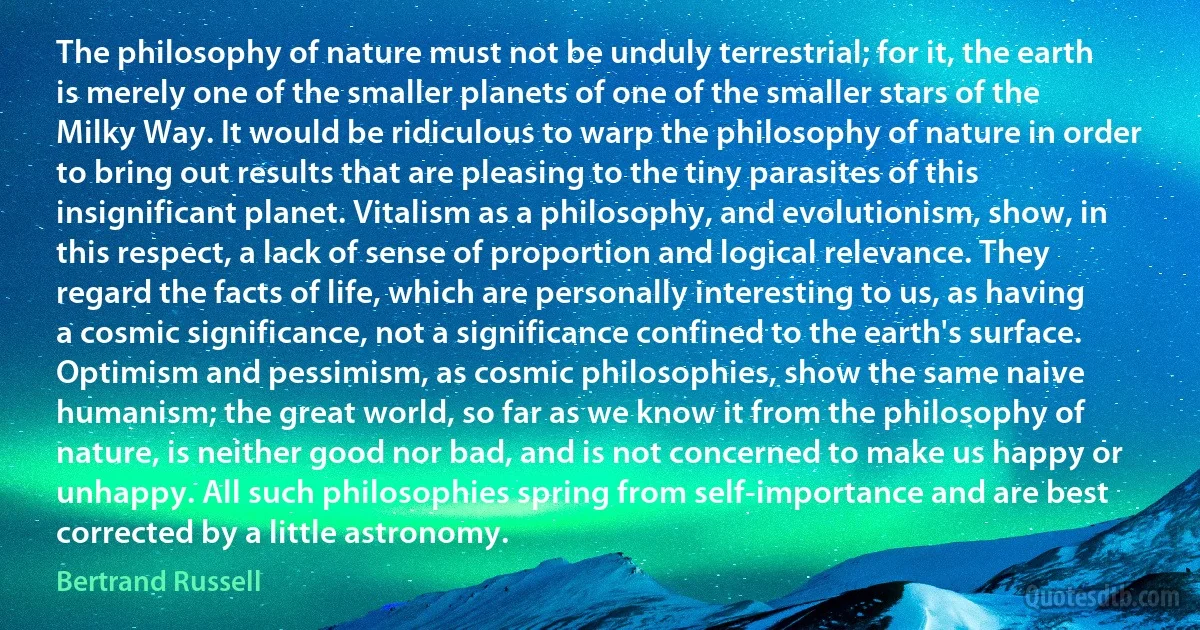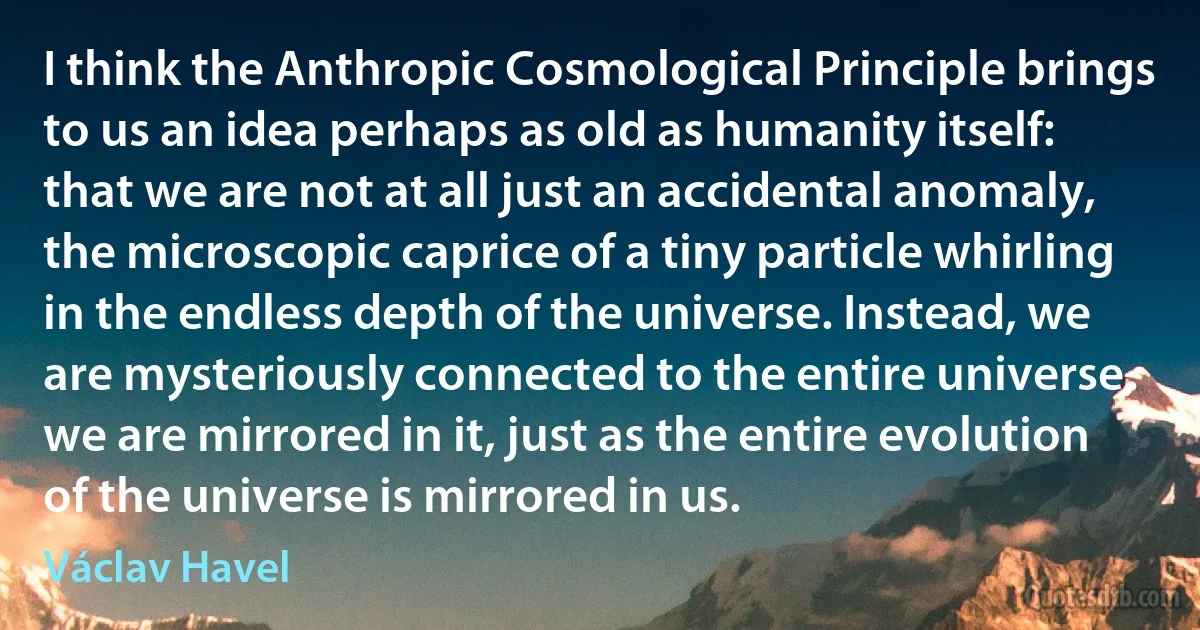Tiny Quotes - page 13
Autumn, cloud blades on the horizon.
The west wind blows from ten thousand miles.
Dawn, in the clear morning air,
Farmers busy after long rain.
The desert trees shed their few green leaves.
The mountain pears are tiny but ripe.
A Tartar flute plays by the city gate.
A single wild goose climbs into the void.

Du Fu
There's a little group of isles beyond the wave,
So tiny you might almost wonder where it is-
That nation is the bravest of the brave,
And cowards are the rarest of all rarities.
The proudest nations kneel at her command,
She terrifies all foreign-born rap-scallions;
And holds the peace of Europe in her hand
With half a score invincible battalions.

W. S. Gilbert
Miniaturization doesn't actually make sense unless you miniaturize the very atoms of which matter is composed. Otherwise a tiny brain in a man the size of an insect, composed of normal atoms, is composed of too few atoms for the miniaturized man to be any more intelligent than the ant. Also, miniaturizing atoms is impossible according to the rules of quantum mechanics.

Isaac Asimov
Giant predator lizards can't evolve in the presence of big mammal predators. So the lesson is that mammals suppress much of the evolutionary potential of modern lizards. Is the Komodo dragon a good working model of how dinosaurs succeeded? Absolutely not. Dinosaurs suppressed the evolutionary potential of mammals, not the other way around. And dinosaurs carried out this supression everywhere, on all the continents, not merely on a few tiny tropical isles. Dinosaurs succeeded where Komodo dragons fail.

Robert T. Bakker
Objects enter into each other... Chardin [French classical still-life painter] was the first to have glimpsed that and rendered the atmosphere of objects... Notice how a light transversal plane straddling the bridge of your nose makes the values more evident to the eye... Well, he noticed that before we did... He neglected nothing. He also perceived that whole encounter in the atmosphere of the tiniest particles, the fine dust of emotion that surrounds objects..

Paul Cézanne
We have an odd relationship with words. We learn a few when we are small, throughout our lives we collect others through education, conversation, our contact with books, and yet, in comparison, there are only a tiny number about whose meaning, sense, and denotation we would have absolutely no doubts if, one day, we were to ask ourselves seriously what they meant. Thus we affirm and deny, thus we convince and are convinced, thus we argue, deduce, and conclude, wandering fearlessly over the surface of concepts about which we have only the vaguest of ideas, and, despite the false air of confidence that we generally affect as we feel our way along the road in the verbal darkness, we manage, more or less, to understand each other and even, sometimes, to find each other.

José Saramago
To Leonardo a landscape, like a human being, was part of a vast machine, to be understood part by part and, if possible, in the whole. Rocks were not simply decorative silhouettes. They were part of the earth's bones, with an anatomy of their own, caused by some remote seismic upheaval. Clouds were not random curls of the brush, drawn by some celestial artist, but were the congregation of tiny drops formed from the evaporation of the sea, and soon would pour back their rain into the rivers.

Kenneth Clark
I've noticed, the wealthy part of my audience is unable to take in classical Romance for more than 40 minutes, one hour for them is maximum. The Art is to be apportioned for them in small doses. Like vitamins which are good for you in tiny portions but could be poisonous when taken in a bulk. Intelligentsia is prepared for such vitamins, while nouve riches are not. They have to begin with homeopathic doses.

Nina Shatskaya
The plane droned on through the black sky, above the clouds masking the Atlantic. It suddenly occurred to Michael that he ought to look at the moon. He hadn't seen it all the time he was in Paris, nor the stars.
He slid up the blind of his window and peered out. There was no moon visible. When he consulted his diary he discovered that it had set, a tiny sliver, at exactly the time the plane had taken off from London.

John Brunner
Yet science is going to tell you that the only things worth describing are those phenomena that can be repeatedly triggered. This is being these are the only phenomena that science can describe and that's the name of the game as far as they are concerned. But we, to claim our freedom, to take advantage of the tiny moment between immense abysses of unknowability, perhaps death, perhaps other reincarnations, perhaps transitions into other life forms, these things we don't know, but in the moment of being human we have the unique opportunity to figure things out. And I have the faith that it is possible, sometime, somewhere, to have a conversation, perhaps no progress will be made until the ninth hour, but to have a conversation in which reality could be literally pulled to pieces, beyond the point of reconstructing.

Terence McKenna
To feel oneself so tiny, so fragile, so inherently losable, was at first spiritually crushing. But, by the same token, this realisation was also strangely liberating: if an individual human existence meant so little, if one's actions were so cosmically irrelevant, then the notion of some absolute moral framework made about as much sense as the universal ether. Measured against the infinite, therefore, people were no more capable of meaningful sin-or meaningful good-than ants, or dust.
Worlds barely registered sin. Suns hardly deigned to notice it. On the scale of solar systems and galaxies, it meant nothing at all. It was like some obscure subatomic force that simply petered out on those scales.

Alastair Reynolds
And I've been on the road for too long, I know I have, because I was in the supermarket the other day, and I saw this tiny, heartbreaking can of beans. And it really made me want to cry. I just thought how old or sick or small do you need to be to need those beans? And it was on a high shelf, you know, you'd be climbing the ladder for days just to get at those four beans.

Dylan Moran
It wasn't as bad, Garraty discovered, if you stared down at your feet as you walked and leaned forward a little. You stared strictly down at the tiny patch of pavement between your feet and it gave you the impression that you were walking on level ground. Of course, you couldn't kid yourself that your lungs and the breath in your throat weren't heating up, because they were.

Stephen King
But can we go to posterity with a sheaf of loose pages, or ask the readers of those days, with the whole of literature before them, to sift our enormous rubbish heaps for our tiny pearls? Such are the questions which the critics might lawfully put to their companions at table, the novelists and poets.

Virginia Woolf
There is a place with four suns in the sky - red, white, blue, and yellow; two of them are so close together that they touch, and star-stuff flows between them. I know of a world with a million moons. I know of a sun the size of the Earth - and made of diamond. There are atomic nuclei a few miles across which rotate thirty times a second. There are tiny grains between the stars, with the size and atomic composition of bacteria. There are stars leaving the Milky Way, and immense gas clouds falling into it. There are turbulent plasmas writhing with X- and gamma-rays and mighty stellar explosions. There are, perhaps, places which are outside our universe. The universe is vast and awesome, and for the first time we are becoming a part of it.

Carl Sagan



